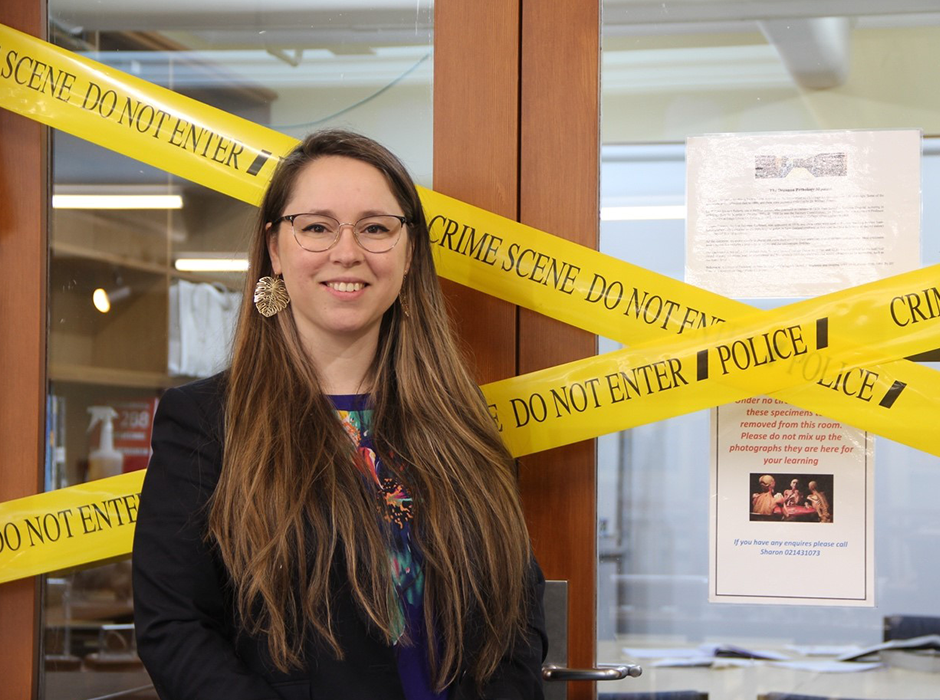
Dr Jade De La Paz outside the mock crime scene created for forensic science students
Otago’s Dr Jade De La Paz has made a career out of unravelling the mysteries hidden in skeletal remains. She has now been recognised for that work by being made a Fellow of the world’s largest professional body for forensic sciences.
Jade, a Professional Practice Fellow/Professional Forensic Anthropologist in the Department of Anatomy, joins just three other people from Aotearoa New Zealand as a Fellow in the American Academy of Forensic Sciences (AAFS), and she is the only Anthropology Section Fellow in the country.
Fellowship is the highest level of membership offered at the AAFS and recognises significant contributions to both AAFS and forensic anthropology as a discipline.
Of AAFS’s 6,500 members, there are only 11 Fellows across Australia and Aotearoa New Zealand, and just two other Anthropology Section Fellows in Australia.
“I feel honoured to be recognised for the international contributions I have made to the field of forensic anthropology in teaching, research, and casework.”
“I am thankful for the opportunities provided by my mentors, particularly Douglas Ubelaker, PhD, D-ABFA, who took a chance on me back in 2010 and helped me become the anthropologist I am today.”
Jade has nearly 15 years’ experience in forensic anthropology, a career that has been a fascinating mix of teaching, research, and casework - in the lab and in the field.
She completed her initial studies in the United States in 2010, before working for the Smithsonian National Museum of Natural History with Dr Ubelaker.
Following completion of her MS in forensic anthropology at Boston University in 2013, she worked at the United States Department of Defense POW/MIA Accounting Agency identifying skeletal remains of American service members killed in World War II, the Korean War, and Vietnam.
Jade has also worked at several medical examiner’s offices across the US.
A move to Aotearoa New Zealand in 2018 saw her complete her PhD with Otago’s Department of Anatomy, and she now teaches and mentors the next generation of forensic scientists at Otago – the country’s only undergraduate forensic science programme.
But she certainly hasn’t left casework behind. Since coming to Otago, she has consulted on forensic anthropology casework for forensic pathologists, coroners, and the New Zealand Police.
She also sits on the Executive Committee of the Australian and New Zealand Forensic Science Society and on the AAFS Standards Board’s Anthropology Consensus Body, where she is helping develop and publish new international standards for forensic anthropology.
“I am so proud to be able to do the work I do, from mentoring my colleagues and students to be great forensic scientists, and conducting research that informs current forensic anthropology practice, to completing casework to give a voice to those who have none.”
“It is incredibly rewarding. But it is also hard to be confronted with difficult cases. I take comfort in knowing that the people I work with – identified or not – will not be forgotten and that I can hopefully help their loved ones find closure.”
Jade likes to make sure students in her class learn in conditions that are as close to real life as possible, so she recently pulled out all the stops for a lesson on analysing crime scenes, including bloodstain patterns, fingerprints, and Tyvek suits.
“Along with my colleague, Head of the Forensic Analytical Science programme, Charlotte King, we created a mock crime scene based on training and advice I have received from forensic practitioners in the United States and Aotearoa New Zealand.”
“I used the most up-to-date international standards on crime scene investigation and reconstruction and had students follow protocols from internationally accredited laboratories.”
Jade noticed that the students were immediately committed to observing, collecting, and preserving evidence to the highest standard.
“In the weeks following the crime scene investigation, they have shown absolute dedication to maintaining chain-of-custody and handling evidence in a professional and scientifically sound manner. I am so proud of them.”
“Our forensic science students constantly impress me, and I strive to connect them to my network of forensic scientists across the world.”
Jade says that she and her team are also building relationships with prospective employers across New Zealand, including Oritain and ESR (Institute of Environmental Science and Research).
“I am privileged to be able to take my experience and everything my mentors have taught me in forensic anthropology and bring it to my students and to the community in Otago.”
“It is such an honour to not only be recognised for my expertise, but also to be welcomed to Aotearoa as a team player in this growing forensic science community. And doing it at Otago with students who are engaged, and with colleagues who I respect, just makes it all the better.”
- Kōrero by Sally Knox, Communications Adviser.